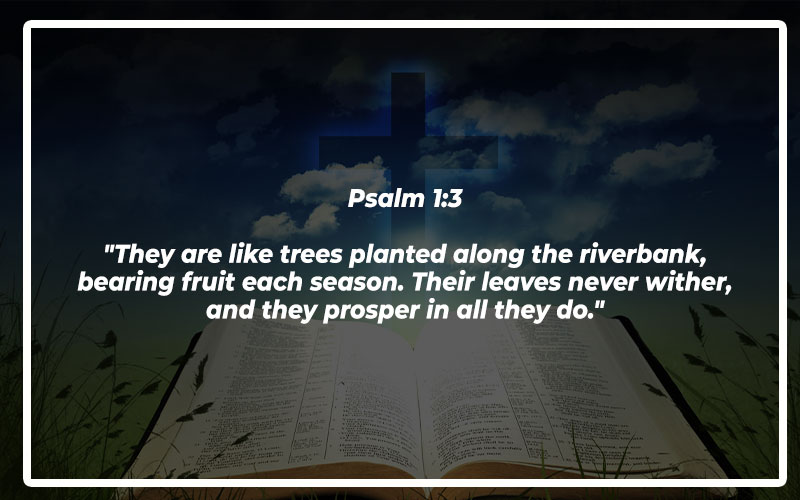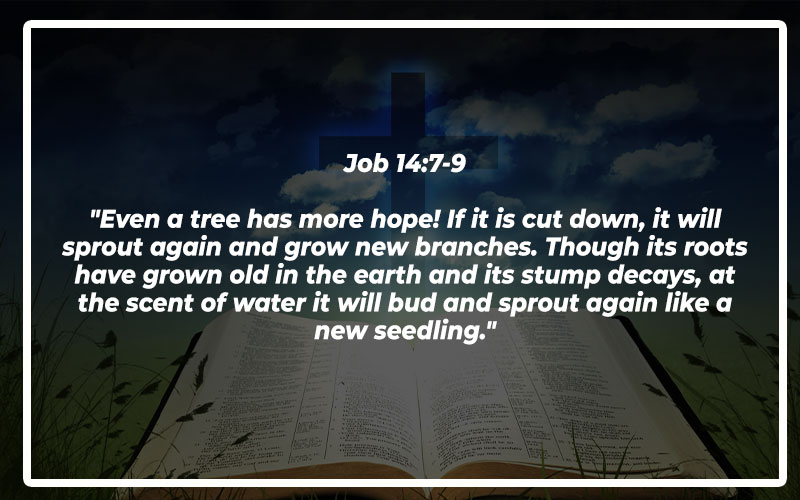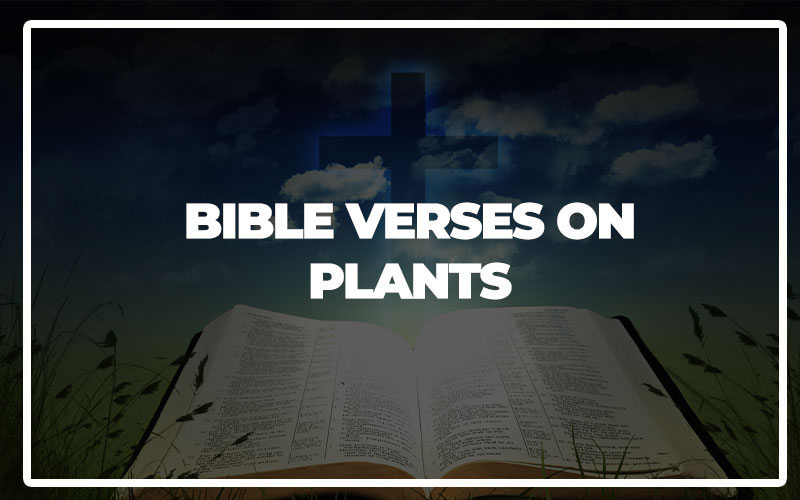The Bible is rich with references to plants, showcasing their beauty and importance in God’s creation.
These verses highlight how plants serve as metaphors for spiritual growth, divine provision, and the intricate design of our Creator.
Here are some key Bible verses that reveal profound truths through the imagery of plants.
Also Read: Bible Verses About Gardening
Plants as Symbols of Growth and Prosperity
Plants often symbolize growth and prosperity in the Bible. From seeds to full-grown trees, these images remind us of the potential for spiritual growth and the blessings that come from God. Let’s explore some verses that illustrate this theme.
Psalm 1:3
“They are like trees planted along the riverbank, bearing fruit each season. Their leaves never wither, and they prosper in all they do.”

This verse emphasizes the blessings that come from living a righteous life. Like trees by the water, those who follow God’s ways are nourished and fruitful, experiencing prosperity in all aspects of life.
Jeremiah 17:8
“They are like trees planted along a riverbank, with roots that reach deep into the water. Such trees are not bothered by the heat or worried by long months of drought. Their leaves stay green, and they never stop producing fruit.”
This verse reassures us that those who trust in the Lord will remain steadfast and productive even in difficult times, drawing sustenance from their deep-rooted faith.
John 15:5
“Yes, I am the vine; you are the branches. Those who remain in me, and I in them, will produce much fruit. For apart from me you can do nothing.”
Jesus uses the metaphor of the vine and branches to illustrate the importance of remaining connected to Him. Our spiritual vitality and productivity depend on our relationship with Christ.
Isaiah 61:3
“To all who mourn in Israel, he will give a crown of beauty for ashes, a joyous blessing instead of mourning, festive praise instead of despair. In their righteousness, they will be like great oaks that the Lord has planted for his own glory.”
This verse speaks of transformation and renewal. God promises to turn our sorrow into joy and to establish us as strong, enduring symbols of His glory, like mighty oaks.
Matthew 13:31-32
“Here is another illustration Jesus used: ‘The Kingdom of Heaven is like a mustard seed planted in a field. It is the smallest of all seeds, but it becomes the largest of garden plants; it grows into a tree, and birds come and make nests in its branches.'”
Jesus uses the mustard seed to describe the Kingdom of Heaven, emphasizing how something small can grow into something magnificent and life-giving, illustrating the power of faith and God’s work in our lives.
Plants as Metaphors for Faith and Obedience
Plants are also used in the Bible to symbolize faith and obedience. Just as plants need care and the right conditions to thrive, our faith requires nurturing through obedience to God’s word. These verses highlight this connection.
Matthew 13:23
“The seed that fell on good soil represents those who truly hear and understand God’s word and produce a harvest of thirty, sixty, or even a hundred times as much as had been planted!”
This verse illustrates the importance of being receptive to God’s word. When we truly understand and apply it, our lives yield abundant spiritual fruit.
Luke 8:15
“And the seeds that fell on the good soil represent honest, good-hearted people who hear God’s word, cling to it, and patiently produce a huge harvest.”
Here, the good soil represents a heart that is open and responsive to God’s teachings. Such a heart, when combined with patience and perseverance, produces a fruitful harvest.
1 Corinthians 3:6-7
“I planted the seed in your hearts, and Apollos watered it, but it was God who made it grow. It’s not important who does the planting, or who does the watering. What’s important is that God makes the seed grow.”
These verses highlight the collaborative nature of spiritual growth and the ultimate role of God in causing growth. While we may plant and water, it is God who brings about the increase.
James 3:18
“And those who are peacemakers will plant seeds of peace and reap a harvest of righteousness.”
This verse connects the act of peacemaking with sowing seeds of peace. By promoting harmony and understanding, we contribute to a righteous and fruitful community.
Galatians 6:7
“Don’t be misled—you cannot mock the justice of God. You will always harvest what you plant.”
This verse serves as a reminder of the principle of sowing and reaping. Our actions have consequences, and we will reap the results of what we sow, be it good or bad.
Plants as Illustrations of God’s Provision
The Bible frequently uses plants to illustrate God’s provision. From the manna provided in the wilderness to the fig tree, these references remind us of God’s faithfulness and care. Let’s delve into some of these verses.
Genesis 1:29
“Then God said, ‘Look! I have given you every seed-bearing plant throughout the earth and all the fruit trees for your food.'”
This verse from Genesis reminds us of God’s provision from the very beginning. He created plants not only for beauty but also to sustain us, providing food and nourishment.
Deuteronomy 8:8
“It is a land of wheat and barley; of grapevines, fig trees, and pomegranates; of olive oil and honey.”
God’s promise to the Israelites included a land abundant with diverse plants, symbolizing His provision and the richness of His blessings. This verse highlights the variety and abundance God offers to His people.
Psalm 104:14
“You cause grass to grow for the livestock and plants for people to use. You allow them to produce food from the earth.”
This psalm praises God for His ongoing provision, acknowledging that it is by His design that plants grow and provide sustenance for both animals and humans.
Isaiah 55:10-11
“The rain and snow come down from the heavens and stay on the ground to water the earth. They cause the grain to grow, producing seed for the farmer and bread for the hungry. It is the same with my word. I send it out, and it always produces fruit. It will accomplish all I want it to, and it will prosper everywhere I send it.”
These verses compare God’s word to rain and snow that nourish the earth, ensuring that it produces a bountiful harvest. Just as water is essential for plant growth, God’s word is vital for spiritual growth and fulfillment.
Matthew 6:28-30
“And why worry about your clothing? Look at the lilies of the field and how they grow. They don’t work or make their clothing, yet Solomon in all his glory was not dressed as beautifully as they are. And if God cares so wonderfully for wildflowers that are here today and thrown into the fire tomorrow, he will certainly care for you.”
Jesus uses the lilies of the field to teach about God’s provision and care. If God so beautifully adorns the flowers, He will surely provide for our needs, encouraging us to trust in His faithfulness.
Also Read: Bible Verses About Trees
Plants as Examples of Resilience and Endurance
Plants often demonstrate resilience and endurance, thriving in various conditions. The Bible uses these characteristics to teach us about perseverance and the strength that comes from faith. Let’s examine some verses that reflect this theme.
Job 14:7-9
“Even a tree has more hope! If it is cut down, it will sprout again and grow new branches. Though its roots have grown old in the earth and its stump decays, at the scent of water it will bud and sprout again like a new seedling.”

This verse from Job highlights the hope and resilience found in nature. Even when a tree is cut down, it can regenerate, symbolizing renewal and the possibility of new beginnings through faith.
Isaiah 40:8
“The grass withers and the flowers fade, but the word of our God stands forever.”
This verse contrasts the temporary nature of plants with the enduring word of God. While plants may wither, God’s promises and truths remain constant and reliable.
Psalm 92:12
“But the godly will flourish like palm trees and grow strong like the cedars of Lebanon.”
This verse celebrates the flourishing of the godly, comparing them to palm trees and cedars, which are known for their strength and resilience. It emphasizes the vitality and stability that come from living a righteous life.
Hosea 14:5-6
“I will be to Israel like a refreshing dew from heaven. Israel will blossom like the lily; it will send roots deep into the soil like the cedars in Lebanon. Its branches will spread out like beautiful olive trees, as fragrant as the cedars of Lebanon.”
God promises to be a source of refreshment and growth for Israel, likening His people to well-rooted and flourishing plants. This imagery conveys the renewal and strength that come from a relationship with God.
Matthew 13:33
“Jesus also used this illustration: ‘The Kingdom of Heaven is like the yeast a woman used in making bread. Even though she put only a little yeast in three measures of flour, it permeated every part of the dough.'”
Though not directly about plants, this parable illustrates the principle of small beginnings leading to significant impact. Just as a little yeast affects the whole dough, a small seed of faith can grow into something powerful and transformative.
Plants as Representations of God’s Wisdom and Design
The intricate design of plants reflects God’s wisdom and creativity. The Bible uses plants to demonstrate the thoughtful care with which God has fashioned the world. Let’s explore some verses that highlight this aspect.
Proverbs 3:18
“Wisdom is a tree of life to those who embrace her; happy are those who hold her tightly.”
This verse likens wisdom to a tree of life, illustrating the nourishment and joy it brings to those who seek and embrace it. It highlights the life-giving nature of God’s wisdom.
Proverbs 11:30
“The seeds of good deeds become a tree of life; a wise person wins friends.”
Good deeds are compared to seeds that grow into a tree of life, suggesting that our actions have the power to produce lasting and positive effects, reflecting God’s wise and purposeful design.
Song of Solomon 2:12
“The flowers are springing up, the season of singing birds has come, and the cooing of turtledoves fills the air.”
This verse from the Song of Solomon captures the beauty and joy of spring, a season of renewal and celebration. It reminds us of the harmonious and delightful world God has created.
Isaiah 35:1
“Even the wilderness and desert will be glad in those days. The wasteland will rejoice and blossom with spring crocuses.”
This prophetic verse envisions a time of restoration and joy, where even the barren places will bloom. It speaks to God’s ability to bring life and beauty to the most desolate areas.
Matthew 6:28
“And why worry about your clothing? Look at the lilies of the field and how they grow. They don’t work or make their clothing.”
Jesus points to the lilies of the field to illustrate God’s provision and care. The effortless beauty of the flowers serves as a reminder of God’s attentive and thoughtful design in all creation.
Also Read: Bible Verses About Nature Beauty

